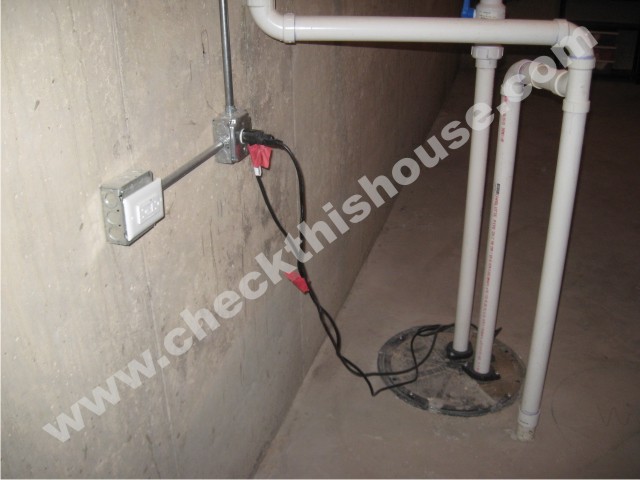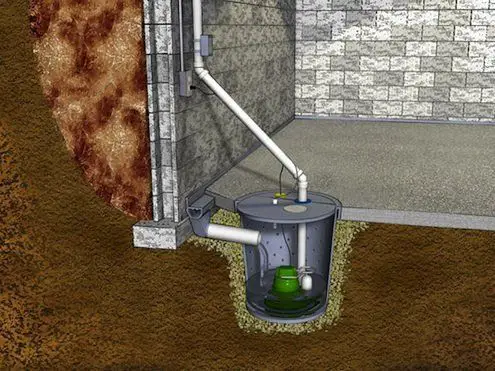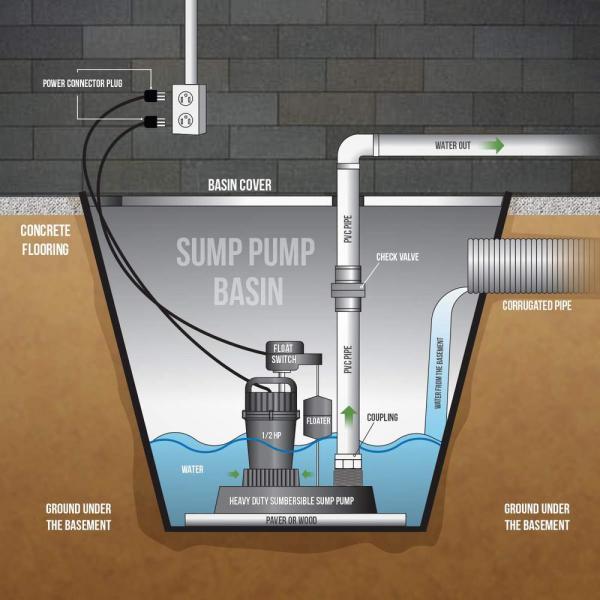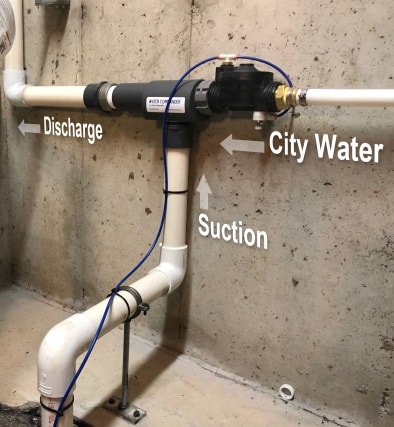Are Gfci Outlets Required for Sump Pumps
A sump pump is a device installed in homes to remove water that has accumulated in the basement or crawl space. Sump pumps are designed to automatically turn on when the water level rises and pump the water out of the home, keeping the area dry.
Many homeowners wonder if they need to install a GFCI outlet for their sump pump. While GFCI outlets are not required by law, they are recommended by most experts as a way to help protect your home from electrical fires.
If you have a sump pump in your home, you may be wondering if you need to install a GFCI outlet for it. The answer is maybe.
If your sump pump is located in an area that is prone to flooding, then installing a GFCI outlet can help protect against electrical shocks. However, if your sump pump is located in a dry area, then there is no need to install a GFCI outlet.
Why use a GFCI on a sump pump
Gfci on Sump Pump
Most houses have a sump pump to help remove water that has accumulated in the basement. These pumps are typically located in a pit, and are used to pump water out of the basement and into a drainage system.
In order to prevent electrical shocks, it is important to have a GFCI (ground fault circuit interrupter) on your sump pump. A GFCI will shut off the power to the pump if it detects an imbalance in the electrical current.
This can happen if the pump gets wet or if there is a short circuit. Without a GFCI, you could be at risk for electrocution if you were to touch the pump while it was operating.
Even if you don’t touch the pump, water could conduct electricity and cause a fire or other damage. Installing a GFCI is not difficult, and it could save your life. If you’re not sure how to do it, hire an electrician or ask your local hardware store for assistance.
Best Gfci Outlet for Sump Pump
When it comes to choosing a GFCI outlet for your sump pump, there are a few things to consider. First, you’ll want to make sure that the outlet is compatible with the specific make and model of your sump pump.
Secondly, you’ll want to check the ratings on the outlet to ensure that it can handle the power output of your particular sump pump. And finally, you’ll want to decide whether you need a single or double outlet configuration.
The best GFCI outlet for your sump pump is one that is specifically designed for use with sump pumps. These types of outlets have special features that make them ideal for protecting against electrical shocks and fires.
They also have higher amperage ratings than standard outlets, so they can handle the increased power output of most sump pumps. If you’re not sure which type of GFCI outlet is right for your needs, ask an electrician or consult the manufacturer’s instructions for your particular model of sump pump.
Does a Sump Pump Need to Be on Its Own Breaker
Most people assume that a sump pump needs to be on its own breaker, but this is not always the case. Depending on the size of your home and the strength of your pump, you may be able to get away with putting it on a shared circuit. However, if you have a particularly large or powerful pump, or if you live in an area with severe weather conditions, it’s best to err on the side of caution and give your pump its own breaker.
Sump Pump Gfci Tripping
If your sump pump keeps tripping the GFCI, there are a few things you can check. First, make sure that the float switch is not stuck in the “on” position.
Sometimes debris can get caught in the switch and cause it to stay on, which will trip the GFCI. You can also try unplugging the pump and then plugging it back in to reset it. If neither of these solutions works, you may need to replace the float switch.
Sump Pump Gfci Nec
A sump pump is a device that is installed in the basement of a home. It is used to remove water that has accumulated in the sump pit.
The water is typically pumped out of the home and into a storm sewer or other drainage system. A sump pump can be powered by electricity, battery, or manual operation.
Most homes have an electrical outlet near the basement floor, which powers the sump pump. Battery-operated pumps are often used as a backup power source in case of a power outage.
Manual pumps are operated by turning a handle to activate the pump. The size of the sump pit will determine the size of the pump needed to remove the water. A larger pit will require a more powerful pump to remove the water in a timely manner.
Sump Pump Gfci Code
If you have a sump pump in your home, you may be wondering if it needs to be GFCI protected. The answer is maybe.
It depends on the specific code requirements in your area. Some codes require all outdoor outlets to be GFCI protected, while others only require GFCI protection for outlets that are within 6 feet of a water source.
If you’re not sure what the requirements are in your area, it’s best to check with your local building department or an electrician. In general, though, it’s a good idea to have a GFCI outlet installed for your sump pump.
This will help protect you and your family from shocks and electrocution if the pump comes into contact with water. It’s also worth noting that even if your local code doesn’t require GFCI protection for sump pumps, many homeowners insurance policies will not cover damages caused by electrical shock unless the outlet is properly protected. So installing a GFCI may end up saving you money in the long run!
Sump Pump Electrical Outlet
A sump pump is a device that is used to remove water that has accumulated in a sump pit. The water is typically pumped out of the pit and away from the home or business.
Sump pumps can be powered by electricity, but they can also be powered by other means such as a gasoline engine. There are many different types and models of sump pumps on the market. Some of the factors that you will want to consider when purchasing a sump pump include the following: -The amount of water that needs to be removed on a daily basis -The size of the sump pit -The power source for the sump pump (electricity, gas, etc.) -Whether you need a backup power source for your sump pump
What Amp Gfci for Sump Pump
If you have a sump pump in your home, you may be wondering what amp GFCI you need for it. The answer depends on the model of sump pump you have and the amperage rating of the GFCI outlet you’re using.
Most sump pumps are rated at 1/3 horsepower or less. This means that they use about 2.5 amps of electricity.
A standard GFCI outlet is rated for 15 amps, so it can handle a sump pump without any problem. However, if your sump pump is a higher-powered model, it may use more than 2.5 amps.
In this case, you’ll need to use a GFCI outlet that is rated for 20 amps or more. You can usually find these outlets at hardware stores or online retailers that sell electrical supplies.

Credit: www.checkthishouse.com
What Type of Outlet is Needed for a Sump Pump?
A sump pump is a device that is used to remove water that has accumulated in a sump pit. The water is typically pumped out of the pit and away from the foundation of a home or business to prevent flooding.
Sump pumps can be powered by electricity, but there are also battery-operated and hand-operated models available. The type of outlet needed for a sump pump depends on the model of pump that you have.
Some pumps come with an adapter that allows them to be plugged into a standard outlet, while others require a special outlet to be installed. Most homes have at least one dedicated circuit for handling sump pumps, so it’s important to check your electrical panel before making your purchase.
Does Sewage Pump Require Gfci?
GFCI (ground fault circuit interrupter) is a type of circuit breaker that is used to protect against electrical shocks. It works by detecting when there is an imbalance in the electrical current and then shutting off the power before it can cause any damage.
Sewage pumps do not require GFCI protection because they are designed to operate in wet environments where there is a risk of grounding. However, it is always a good idea to consult with an electrician to make sure that your pump is properly protected.
Does a Sump Pump Require a Dedicated Outlet?
A sump pump does not require a dedicated outlet, but it is recommended. If you have a power outage, your sump pump will not work and your basement could flood. A dedicated outlet ensures that your sump pump will always have power.
Can You Plug a Sump Pump into a Regular Outlet?
If you have a regular outlet in your basement, you can absolutely plug a sump pump into it! Sump pumps are designed to help remove water that has accumulated in a sump pit, and they typically come with long power cords so that you can reach an outlet. Keep in mind, however, that sump pumps do require a lot of power to run properly, so if your outlet is already being used by another appliance or device, it’s best to use a different one.
Also, make sure the outlet you choose is not located near any water sources, as this could create a dangerous situation.
Conclusion
Sump pumps are used to pump water out of basements or crawlspaces to prevent flooding. They are usually installed in a sump pit, which is a hole that is dug in the floor of the basement or crawlspace.
GFCI outlets are not required for sump pumps, but they can be helpful in preventing electrical shocks. GFCI outlets have sensitive circuitry that can detect changes in current and shut off the power if it detects an imbalance. This can help to prevent electrocution if someone were to come into contact with the water that the sump pump is pumping out.



